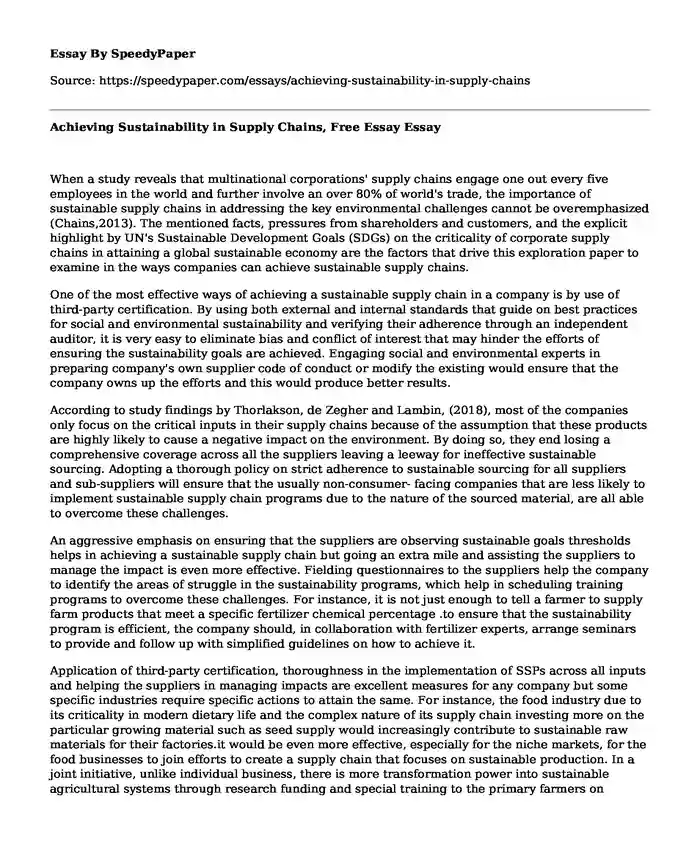
| Type of paper: | Critical thinking |
| Categories: | License Supply chain management |
| Pages: | 3 |
| Wordcount: | 726 words |
When a study reveals that multinational corporations' supply chains engage one out every five employees in the world and further involve an over 80% of world's trade, the importance of sustainable supply chains in addressing the key environmental challenges cannot be overemphasized (Chains,2013). The mentioned facts, pressures from shareholders and customers, and the explicit highlight by UN's Sustainable Development Goals (SDGs) on the criticality of corporate supply chains in attaining a global sustainable economy are the factors that drive this exploration paper to examine in the ways companies can achieve sustainable supply chains.
One of the most effective ways of achieving a sustainable supply chain in a company is by use of third-party certification. By using both external and internal standards that guide on best practices for social and environmental sustainability and verifying their adherence through an independent auditor, it is very easy to eliminate bias and conflict of interest that may hinder the efforts of ensuring the sustainability goals are achieved. Engaging social and environmental experts in preparing company's own supplier code of conduct or modify the existing would ensure that the company owns up the efforts and this would produce better results.
According to study findings by Thorlakson, de Zegher and Lambin, (2018), most of the companies only focus on the critical inputs in their supply chains because of the assumption that these products are highly likely to cause a negative impact on the environment. By doing so, they end losing a comprehensive coverage across all the suppliers leaving a leeway for ineffective sustainable sourcing. Adopting a thorough policy on strict adherence to sustainable sourcing for all suppliers and sub-suppliers will ensure that the usually non-consumer- facing companies that are less likely to implement sustainable supply chain programs due to the nature of the sourced material, are all able to overcome these challenges.
An aggressive emphasis on ensuring that the suppliers are observing sustainable goals thresholds helps in achieving a sustainable supply chain but going an extra mile and assisting the suppliers to manage the impact is even more effective. Fielding questionnaires to the suppliers help the company to identify the areas of struggle in the sustainability programs, which help in scheduling training programs to overcome these challenges. For instance, it is not just enough to tell a farmer to supply farm products that meet a specific fertilizer chemical percentage .to ensure that the sustainability program is efficient, the company should, in collaboration with fertilizer experts, arrange seminars to provide and follow up with simplified guidelines on how to achieve it.
Application of third-party certification, thoroughness in the implementation of SSPs across all inputs and helping the suppliers in managing impacts are excellent measures for any company but some specific industries require specific actions to attain the same. For instance, the food industry due to its criticality in modern dietary life and the complex nature of its supply chain investing more on the particular growing material such as seed supply would increasingly contribute to sustainable raw materials for their factories.it would be even more effective, especially for the niche markets, for the food businesses to join efforts to create a supply chain that focuses on sustainable production. In a joint initiative, unlike individual business, there is more transformation power into sustainable agricultural systems through research funding and special training to the primary farmers on achieving the set goals (Smith ,2008).
From the analysis above, achieving a sustainable supply chain majorly depends on the willingness of the business entities themselves to put strict rules on the quality of the supplies and thoroughness in tracking all their inputs to ensure they are produced in a way that does not hurt both the environment and social progression. Maintaining high levels of integrity in their sourcing will work a long way into achieving sustainability because the suppliers will be left with no choice to but to adhere to sustainable practice for them to continue with the trade.
References
Chains, G. V. (2013). Development: Investment and value-added trade in the global economy. In United Nations Conference on Trade and Development (UNCTAD) publication. New York and Geneva: United Nations.
Smith, B. G. (2008). Developing sustainable food supply chains. Philosophical Transactions of the Royal Society B: Biological Sciences, 363(1492), 849-861.
Thorlakson, T., de Zegher, J. F., & Lambin, E. F. (2018). Companies' contribution to sustainability through global supply chains. Proceedings of the National Academy of Sciences, 201716695.
Cite this page
Achieving Sustainability in Supply Chains, Free Essay. (2022, Apr 19). Retrieved from https://speedypaper.com/essays/achieving-sustainability-in-supply-chains
Request Removal
If you are the original author of this essay and no longer wish to have it published on the SpeedyPaper website, please click below to request its removal:
- Essay Sample: Psychological Report for the Boy with Intellectual Disability
- Essay Example on the Rights of the Elderly to Request Voluntary Euthanasia
- Measures of Democracy and Dictatorship - Political Science Essay Sample
- Essay Sample on Martin Luther King Jr's Letter from Birmingham Jail
- Free Essay: Sculpture and Body Politics
- The Function of a Barrier in The Metamorphosis and The Yellow Wallpaper, Literary Essay Sample
- Essay Sample on Taking Care of Family Caregivers
Popular categories




